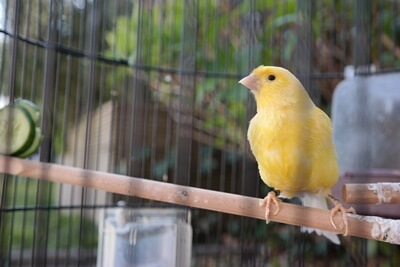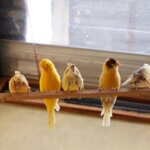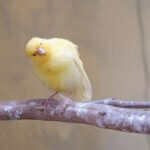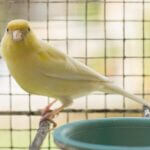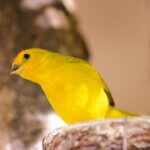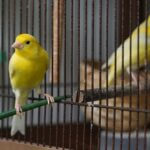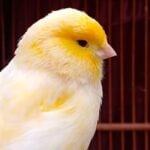Canaries are popular pets due to their happy nature, small size, and beautiful appearance. These feisty little birds thrive when kept alone, which isn’t common in birds.
Understanding a canary’s body language can be difficult because there are often several explanations for that behavior. Canaries puff up their feathers for benign and severe reasons alike.
If your canary is regularly puffing up, you should investigate why to check that it’s happy and healthy. A canary might puff its feathers due to cold, sickness, distress, or aggression.
There’s also a chance that puffing isn’t caused by its feathers, as canaries are susceptible to air sac ruptures, which create a bulging appearance.
Finding out the cause of your canary’s feather puffing is a process of elimination, so you need to consider the canary’s body language, energy levels, and living environment.
Your canary may be puffing its feathers to stay warm. But does it feel cold because of where its cage is positioned or because it’s got a respiratory infection and needs expert care?
What Does it Mean When Canaries Puff Up?
Low temperatures and agitation are the most common reasons for puffed-up feathers in canaries. Although friendly and inquisitive in nature, canaries can be easily stressed by;
- Loud noises
- Unfamiliar surroundings
- New animals or people
Failing to properly introduce a new canary to the cage can stress it. Likewise, allowing predatory pets, such as cats, to get too close to the cage may lead to feather puffing as a sign of:
- Distress
- Fear
- Aggression
These emotional displays may be accompanied by:
- Wing flapping
- Attempts at escape
- Screeching
- Rapid breathing with a semi-open beak
If your canary is subjected to long-term stress, it’s likely to stop singing and vocalizing altogether. It’ll also experience decreased appetite and begin to pick or pull at feathers when the distress is extreme. Long-term stress can encourage other unhealthy or abnormal behaviors.
According to the Journal of Applied Animal Welfare Science, our understanding of caged domestic birds’ behavior remains limited. However, excessive feather puffing, picking, and plucking are indicators of stress, illness, or aggression.
The exception is feather puffing as a way to control body temperature. Canaries are warm-climate birds that excel in moderately warm conditions, so a canary in a cold room will feel uncomfortable.
Puffing feathers is how birds cope with chills since doing so traps air in their plumage and allows them to retain body heat more easily. This could be why if you see your canary puffing its feathers for no reason.
Check your thermostat to ensure that the temperature in your home hasn’t fallen below 65 degrees Fahrenheit. If it has, raise the temperature and wait to see if your canary de-puffs its feathers.
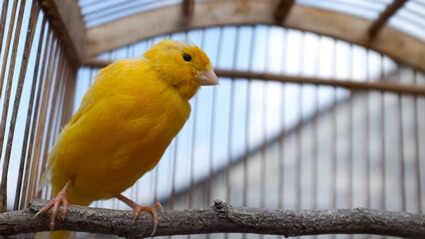
Why Is My Female Canary Puffing Up?
With one exception, male and female canaries puff up for the same reasons.
If you have been attempting to mate your canaries, swelling, puffing, or enlargement of the abdomen area signifies that a female canary is becoming ready to lay eggs. If the puffing you see in your canary is localized to its abdominal area, this is likely the case.
You should consult a vet if you see this abdominal swelling in a canary that lives alone.
Why Does My Canary Puff Its Feathers Regularly?
If you see your canary regularly puffing up its feathers, your first step is to check its living environment. Is it experiencing a draft? Is there something in the area that could stress it out?
Ask yourself these questions, and then try changing its environment pre-emptively.
A canary with puffed feathers and no other abnormal body language may be cold. However, if it’s also flapping its wings and screeching, this could be fear-based aggression.
Likewise, if it is plucking or pulling fluffed feathers, it could be experiencing prolonged stress. If you notice feather picking or plucking, you should consult a vet.
According to Clinical Avian Medicine, feather picking and other forms of self-mutilation aren’t only symptoms of intense distress but potential causes of skin conditions, infections, and diseases. However, actions like this can also occur as a reaction to skin conditions and parasites.
Other signs of a seriously ill canary include:
- Excessive yawning
- Excessive sneezing
- Vomiting
- Coughing
- Loose or water droppings
- Oversleeping
- Reluctance to interact
- Nasal discharge
- Lying at the bottom of the cage with minimal movement
Why Is My Canary Puffed Up All the Time?
Old canaries reaching the latter stages of life may puff up their feathers consistently.
If your senior canary stops eating, starts sleeping more often, becomes unsociable, and puffs up its feathers a lot, it may be dying.
Like all birds, canaries have air sacs. These sacs are located throughout the body and are fairly sensitive. If traumatized, avian air sacs can rupture.
Air sac rupture has severe implications for any bird that experiences it, as this can impact its ability to eat, fly, walk, hop, and breathe.
While minor ruptures may self-heal, major ruptures need quick treatment to prevent sudden death.
How To Spot A Ruptured Air Sac
A ruptured air sac has a distinctive appearance. When an air sac ruptures, air will begin to leak out and become stuck under the birds’ skin, leading to the ballooning of the skin.
At first, this may look like your canary has puffed its feathers. However, it’ll soon become apparent that this isn’t the case.
These balloons of air can become very large and grotesque in appearance. Such lumps are characterized not just by their size but by the transparent appearance of the ballooned skin.
The treatment for air sac rupture varies. Sometimes, your vet will use a sterile needle to empty or deflate the air sac, which may be done more than once as the sac re-inflates.
Once the pressure has been relieved, any remaining air should be absorbed into your canaries system. In more severe cases, surgical intervention might be needed.
Assuming your canary receives attention quickly, most illnesses that can cause feather puffing or swelling of the flesh should be treatable.
If the issue is non-medical, an assessment of your canary’s environment and body language will help you ascertain the causes of feather puffing.

